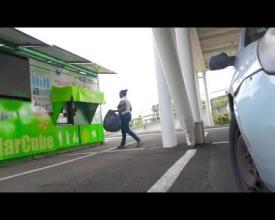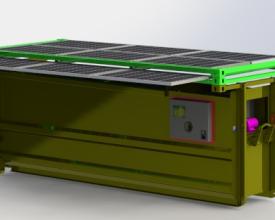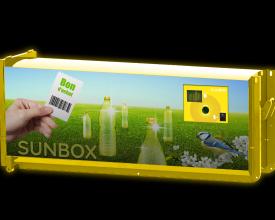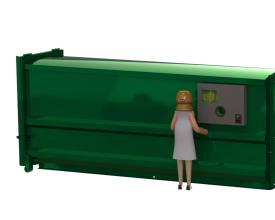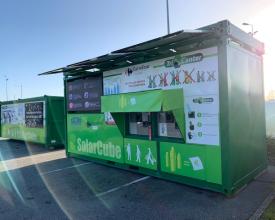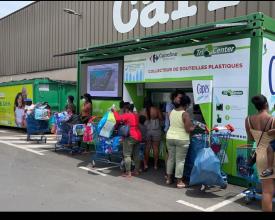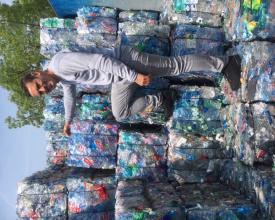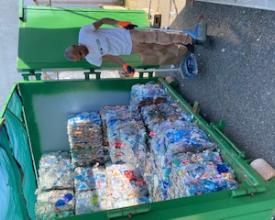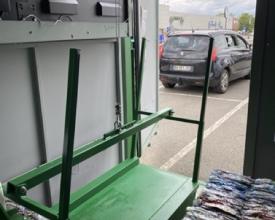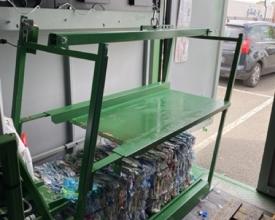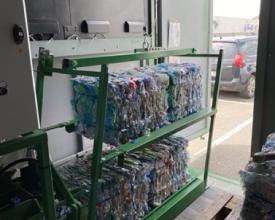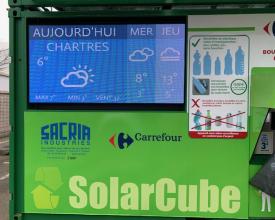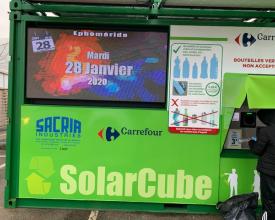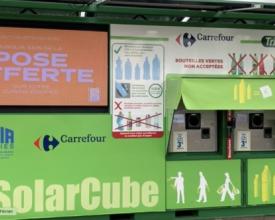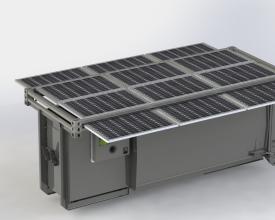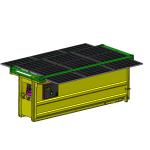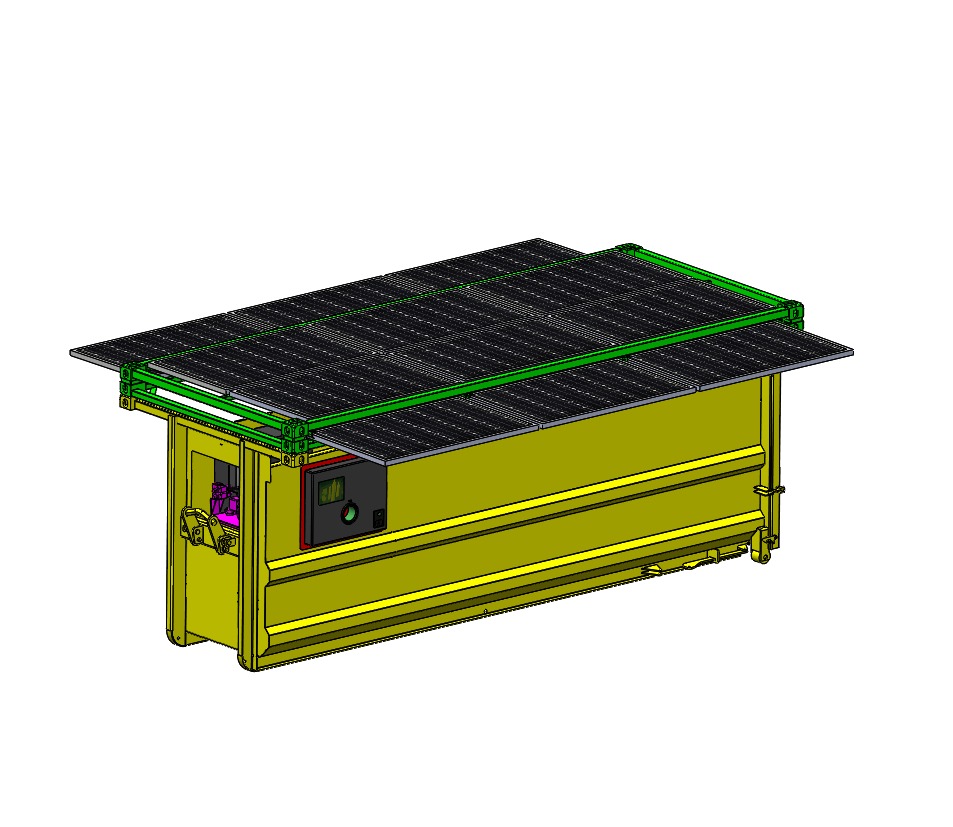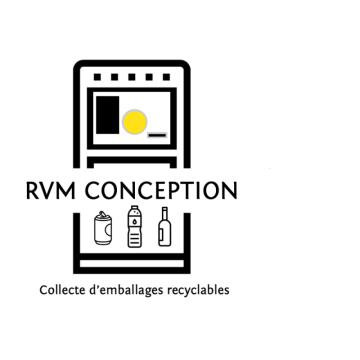
Solar street furniture dedicated to the collection of recyclable packaging
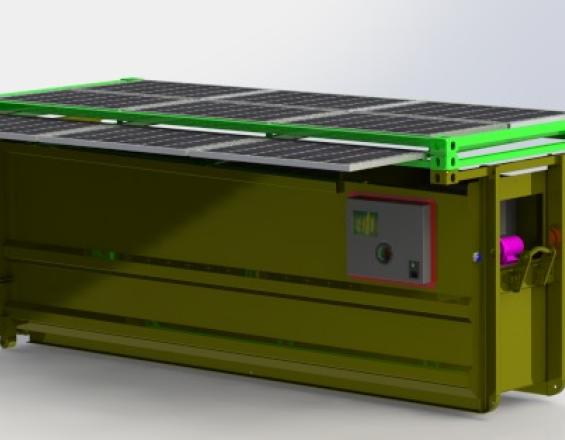
Plastic pollution is a major problem on island territories which often lack infrastructure for processing recyclable materials. They are either buried or incinerated while a circular economy is possible.
Citizens who use the Sunbox or the Solarcube are rewarded for their ecological gesture with a voucher proportional to the number of plastic bottles or cans introduced into our RVM (Reverse Vending Machine).
The Sunbox is a compaction box with 1 to 4 rvm that compact plastic bottles, glass bottles or cans. The storage capacity depends on the volume of the compaction chamber which is beetween 11 to 20 m3. This corresponds, for example, to 75,000 plastic bottles (11m3) to 130,000 plastic bottles (20m3).
The Solarcube is less efficient than the Sunbox because its storage capacity is 6,000 bottles.
Context
Challenges addressed
The collection of recyclable packaging in the voluntary contribution terminals does not work well. Collection results are stagnating. Wild deposits around these terminals are increasing. Additonallay the terminals are expensive to maintain. The challenge was to inspire part of the population to sort recyclable packaging, especially plastic bottles. The incentive is proportional to the deposite.
The implementation of a Sunbox is based on a win-win partnership. - The urban community increases its collection volumes of recyclable packaging. - Partner store increases sales and attendance - users increase their purchasing power by performing an ecological gesture.
The Guadeloupe region took part in the project because household waste is mostly buried or incinerated without recycling. The cost of treatment has become very expensive (around 500€/ton).
Location
Process
Summary of the process
The Sunbox equipment such as the Double compaction, the solar panels and the RVM make this innovation a unique urban furniture in the world. All these innovations make the operation of the Sunbox profitable and sustainable. We collect nearly 100 tons of PET per year which represents 60,606€ of income for the users (0,02€/bottle), the sale of PET can generate more than 65,000€ per year (650€/ton). The transformation of recycled packaging collected (plastic bottles or cans) allows to limit to the maximum the human interventions and thus the associated expenses.
Building Blocks
Huge storage capacity for the Sunbox
In order to limit the handling of the collected bottles as much as possible, we have integrated a double compaction system in the Sunbox with contaienr beetween 11 to 20 cubic meter.
Enabling factors
It's important to adjust the compaction power correctly according to the recyclable elements collected and to place the sensors in an efficient way to automate the compaction cycles.
Lesson learned
In view of the large collection of bottles, some of which are colored, we are thinking about a solution to split the storage box into 2 parts to have 2 different flows of plastic. On the right of transparent plastic and on the left colored plastic.
Giant LED screen to communicate and boost profitability
The Solarcube it's a Sunbox version with small baler inside.
We have integrated a giant LED screen to communicate with our users about the recycling of the bottles, which they put in the Solarcube. It informs about the importance of recycling and the bottle to bottle process.
Thanks to the 4G modem card in the Solarcube, we can remotely manage all the photos and videos displayed on this screen
Enabling factors
It is important to offer communication spaces to the different partners linked to the Solarcube so that they can spread their environmental message and the reasons why they are partners
Lesson learned
The Solarcube is 100% autonomous via solar energy, we have been forced to limit the hours of diffusion of the LED screen because it consumes a lot of electricity and this poses a problem because the batteries, in the evening can no longer recharge without the contribution of the sun. It is necessary to limit the hours of diffusion according to the sunshine and the place of exploitation.
autonomous operation thanks to solar panels
The Sunbox has 12 solar panels that allow autonomous operation. In addition, solar panels protect users from rain and sun.
Enabling factors
Thanks to the solar panels, it is not compulsory to connect the Sunbox to electricity. However, for 24-hour operation, it is necessary to connect it to electricity.
Lesson learned
For better user comfort, we have planned to place the RVMs on each side of the Sunbox. This allows you to create 2 separate queues
Impacts
Around 5,000 users use the Sunbox each month. We have forged partnerships with hospitals, police stations, the army, urban communities so that they come and drop off their plastic bottles and take advantage of the voucher for their community.
Many users collect plastic bottles on the beach or in the mangroves, allowing effective cleaning of sensitive areas. this preserves the ecosystem and promotes tourism. Some users bring back more than 10,000 bottles per month, this improving their standard of living and social status.
The 3 Solarcube of Martinique( installed in 2019) have collected 256 tons of PET in 3 years, which represents 7,700,000 plastic bottles. There is no bottle processing center in Martinique. The 2 Solarcubes in Guadeloupe have collected 218 tons in 2 years, 6,600,000 plastic bottles. The city centers in which the Solarcube were located no longer had bottles on the streets because they were picked up by Solarcube users. Between 200 and 300 kg of PET collected every day by a single Solarcube. The Solarcube collect between 200,000 and 270,000 plastic bottles each month in Guadeloupe. The Sunbox is autonomous thanks to solar panels. It is mobile and secure.
Beneficiaries
Sunbox users come for different reasons: Some of them are in great financial difficulty and are struggling to buy food to feed their families.
Other users qant to be certain that the recyclable packaging deposited will be 100% recycled.
Sustainable Development Goals
Story
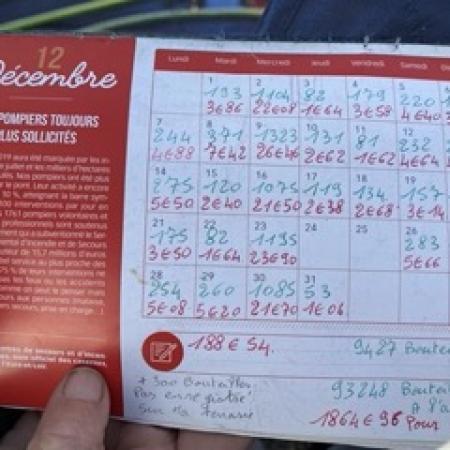
I would like to share the story of Françoise who is one of our most loyal customers at the Sunbox in Chartres. She is retired and does not earn enough money to live with dignity. She therefore bet on collecting bottles to improve her daily life and be able to shop in the Carrefour store where the Solarcube is located.
She notes in her notebook all the plastic bottles brought to the Sunbox over the past 3 years. She has created a group of people who give her bottles, she also finds some in the city on the ground or in the garbage cans.
in 2019, it accumulated 37,833 plastic bottles for a total amount of €756.66
in 2020 it exceeded its record with 93,248 bottles for a total amount of €1,864.96
In 2021, it accumulated 134,852 plastic bottles for a total amount of €2,697.04

